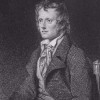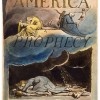
Stephanie Kuduk Weiner, “On the Publication of John Clare’s The Rural Muse, 1835″
This entry places John Clare’s book The Rural Muse in the context of the publishing landscape of 1835. Tracing the publication history of two poems that appeared in that volume as well as in the periodical press and in literary annuals, “A Spring Morning” and “The Nightingale’s Nest,” Weiner shows how attending to the modes and formats of print publication illuminates thematic and formal aspects of Clare’s poems. Clare’s approach to the sonnet, his treatment of nature, and his concept of the book are examined.

Diane Piccitto, “On 1793 and the Aftermath of the French Revolution”
In 1789, many British radicals interpreted the early events of the French Revolution in mythic terms, as signs that a cataclysmic event, akin to the Christian apocalypse (entailing the renovation of the fallen world), was at hand—and that, paradoxically, human beings rather than God were the agents of this absolute change. However, two major events in 1793 undermined the optimism of these readings: the regicide of Louis XVI and the start of the subsequent Reign of Terror. These disturbing events left many radicals questioning the viability of revolution and, more specifically, the efficacy of violence in producing fundamental and widespread change for the better. Using William Blake’s America as a case study, this article examines how the violence of 1793 not only complicated and ultimately terminated the possibility of interpreting the revolutionary events in France as a fulfillment of the grand biblical narrative of human regeneration but also placed in doubt the potential for human interventions in the historico-political realm to ever initiate this new world.

E. Warwick Slinn, “On Robert Browning’s Men and Women“
Robert Browning’s Men and Women, a two volume publication of new poems, was a major literary event in nineteenth-century Britain. These poems shift emphasis from the private, atemporal, and generally non-social genre of Romantic lyricism to the ironies and enigmas of human awareness and social relationships, to dramatic action in human speech. Browning’s men and women are presented overtly as speech acts, grounded in psychological and cultural origins, and in the ambiguities of linguistic processes. Readers often found Browning’s mode of writing obscure, but its methods and implications consistently engage with other domains of Victorian thought—in religion, biology, and psychiatry. While the status of this publication was not widely understood at the time, its value is manifest in its reception history, in the discussion and representations that constitute its ongoing existence as a historical event.
